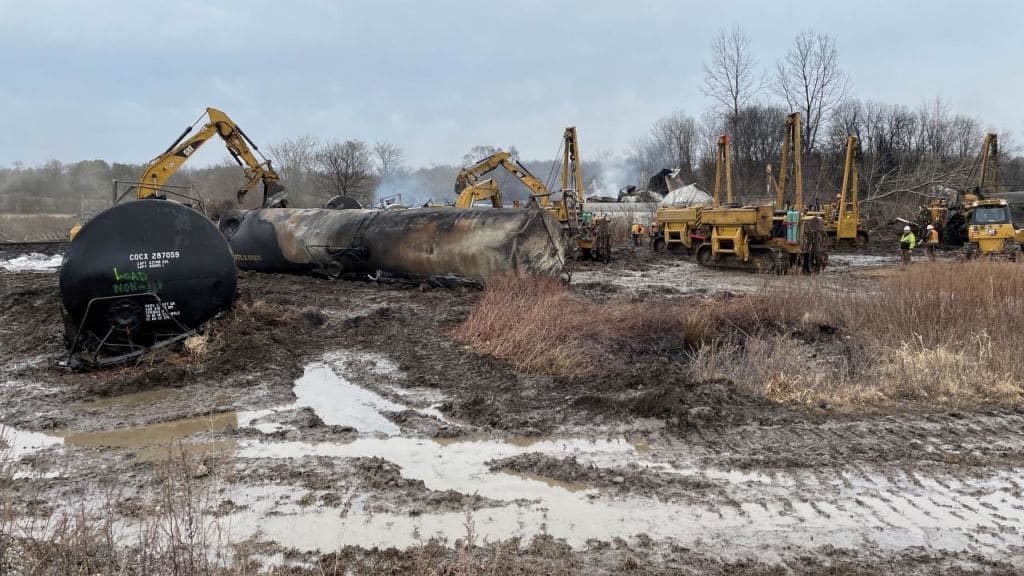Cincinnati stops using Ohio River water 'out of an abundance of caution' following East Palestine train disaster


A free daily email with the biggest news stories of the day – and the best features from TheWeek.com
You are now subscribed
Your newsletter sign-up was successful
The city of Cincinnati on Friday announced it would be temporarily shutting off all intake from the Ohio River, as the region continues to grapple with the ongoing fallout from the Feb. 3 derailment of a shipping train carrying toxic chemicals near the town of East Palestine, Ohio. Citing an "abundance of caution," Cincinnati officials confirmed in a release they would be tapping the city's water reserves until such time as the City of Cincinnati and Greater Cincinnati Water Works determine it is safe to resume using water from the Ohio River.
The city's announcement comes the same day as Ohio Gov. Mike DeWine (R) worked to assure the public that any contamination of the river has since dissipated to negligible levels, and that the water was again "safe to drink."
Per the city's press release, municipal waterworks analysts have already conducted tests on 130 samples of Ohio River water at the Cincinnati intake site, finding "no detectable levels of the chemicals" from the train derailment to date. Nevertheless, the city will apply "additional optimized treatment [to Ohio River water] once the intakes are reopened, even if no chemicals are detected."
The Week
Escape your echo chamber. Get the facts behind the news, plus analysis from multiple perspectives.

Sign up for The Week's Free Newsletters
From our morning news briefing to a weekly Good News Newsletter, get the best of The Week delivered directly to your inbox.
From our morning news briefing to a weekly Good News Newsletter, get the best of The Week delivered directly to your inbox.
For the time being, the decision to tap the local water reserves seems to be as much about public confidence as it is public safety. "There's zero risk that our water reserves contain contaminants from the train derailment site," City Manager Sheryl Long stressed in a statement. Accordingly, using the reserves "will give us all peace of mind."
Despite these assurances from DeWine and others, some are still skeptical that the ecological impact of the derailment and chemical spill is indeed finished. On Thursday, newly-elected Ohio Sen. J.D. Vance (R) posted a video of himself at an East Palestine creek, pointing out "dead worms and dead fish all throughout this water" as he used a stick to show purported chemicals on the surface of the water.
"The fact that these chemicals are still seeping into the ground is an insult to the people who live in East Palestine," Vance said. "Do not forget these people."
A free daily email with the biggest news stories of the day – and the best features from TheWeek.com
Rafi Schwartz has worked as a politics writer at The Week since 2022, where he covers elections, Congress and the White House. He was previously a contributing writer with Mic focusing largely on politics, a senior writer with Splinter News, a staff writer for Fusion's news lab, and the managing editor of Heeb Magazine, a Jewish life and culture publication. Rafi's work has appeared in Rolling Stone, GOOD and The Forward, among others.
-
 6 of the world’s most accessible destinations
6 of the world’s most accessible destinationsThe Week Recommends Experience all of Berlin, Singapore and Sydney
-
 How the FCC’s ‘equal time’ rule works
How the FCC’s ‘equal time’ rule worksIn the Spotlight The law is at the heart of the Colbert-CBS conflict
-
 What is the endgame in the DHS shutdown?
What is the endgame in the DHS shutdown?Today’s Big Question Democrats want to rein in ICE’s immigration crackdown
-
 Scientists are worried about amoebas
Scientists are worried about amoebasUnder the radar Small and very mighty
-
 A Nipah virus outbreak in India has brought back Covid-era surveillance
A Nipah virus outbreak in India has brought back Covid-era surveillanceUnder the radar The disease can spread through animals and humans
-
 Trump HHS slashes advised child vaccinations
Trump HHS slashes advised child vaccinationsSpeed Read In a widely condemned move, the CDC will now recommend that children get vaccinated against 11 communicable diseases, not 17
-
 Deaths of children under 5 have gone up for the first time this century
Deaths of children under 5 have gone up for the first time this centuryUnder the radar Poor funding is the culprit
-
 A fentanyl vaccine may be on the horizon
A fentanyl vaccine may be on the horizonUnder the radar Taking a serious jab at the opioid epidemic
-
 Health: Will Kennedy dismantle U.S. immunization policy?
Health: Will Kennedy dismantle U.S. immunization policy?Feature ‘America’s vaccine playbook is being rewritten by people who don’t believe in them’
-
 More adults are dying before the age of 65
More adults are dying before the age of 65Under the radar The phenomenon is more pronounced in Black and low-income populations
-
 Ultra-processed America
Ultra-processed AmericaFeature Highly processed foods make up most of our diet. Is that so bad?
